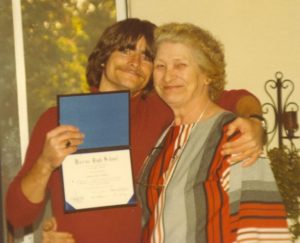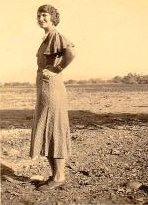
My grandmother was a tough lady. In all the years I knew her, I only saw her cry twice. The first time was when my brother was murdered. The second was when she told me what it was like to starve.
In The Grapes of Wrath, Steinbeck wrote about the severe hunger and starvation Okies suffered when they finally made it to California. When I first read the book, the idea seemed an abstraction to me, part of the printed page, an element of the story, but not a real thing. I’d never been hungry, at least not with a hunger that couldn’t be satiated by a walk into the kitchen or a quick stop at McDonald’s. But in the world Steinbeck created, malnutrition and starvation were a constant threat to the survival of the Okies, and worse, a blight upon their children that they were helpless to prevent.
I’m not entirely sure I had believed such a thing was possible.
Having lived with my grandmother during my earliest years, along with my mother, I remember how funny I thought it was to watch her eat. From whatever meat was on her plate, she would eat not just the meat, but the fat and gristle, too. Then she would gnaw on the bone and suck out whatever juices were left in it. If she saw you hadn’t eaten the fat off of your plate, she’d ask if she could have it, and then she’d eat that, too. Sometimes, she’d ask for your bones and give them a good going over, as well.
As long as I knew her, she always ate that way.
I don’t remember how our conversation about starvation began. I tend to think it
was part of the same one in which she told me the story about Aunti Jedie and the theater manager, which I recounted in my previous post. But she began to tell me not just about being hungry, but about literal starvation. No food at all, or so little of it as to not make much of a difference. And this was not for a day, but for days and weeks at a time.
Then she said, “We almost starved to death.”

When the tears started and that anguished tone came into her voice as she spoke, I knew it wasn’t an exaggeration I was hearing from her.
“We would have died if it weren’t for the government camps.”
She went on then to tell me about her love for Franklin Delano Roosevelt, who she credited for the “government camps” that had “saved our lives.”
It is a strange and startling thing to hear someone you love cry remembering what it had been like to have nothing to eat for so long that she was certain she would die.
A significant part of Steinbeck’s novel is written about the government camp called “Weedpatch.” There, the Joads find a renewed sense of dignity, insulated from the prejudice and oppression that waited outside the gates. But they still had to eat. They still needed work. So, when there was no work, they had to leave the haven they had found and submit once more to the exploitation of the growers – and starvation wages.
Grandma didn’t go into detail about the “government camps” that had saved her and her family, but I surmise the camps must have fed their charges as well as giving them a place to live. Clean running water can save lives, to be sure, but it cannot keep a person from starvation.
Before I knew any of this, I always associated my grandmother with food. She was a cook working in a burger and pancake joint on Fruitvale Avenue, in Oakland, for most of my childhood and early adult years. The place was called “Mel’s.”
(No, seriously. Mel’s. Only there was no Mel. Larry owned the joint, and Larry was himself a character that could have played a central role in any great Steinbeck novel.)
Mel’s had been a two-story house once, but the spacious first floor had been converted into a restaurant, with the upstairs still having all the rooms and furniture of a home. No one lived in that upstairs part of the building, and I never quite understood why – because it was a home like any other, but empty of living souls. The few times I was up there, I remember finding the space rather eerie.
Downstairs though was the bustling restaurant that had the greatest hamburgers and fries in the world. The menu included New York strip steaks, an almost infinite variety of burgers, sandwiches, prawns, onion rings, and a selection of unique and arguably gourmet pancakes. I remember those pancakes as the most amazing I’ve ever eaten, even to this day. There was the usual breakfast fare as well, eggs any way you wanted them, bacon, hash browns, and sausages.
There were two main dining areas, and a small banquet room in the back.
The kitchen was front and center against one side of the building. Almost anywhere you sat, you could see the cooks and watch everything they were doing out in the open. This was Grandma’s domain. She ruled the roost back there and had a mastery of it that impressed me even when I was a young adult. The way she cooked and kept the assembly of every order together throughout the process was just dazzling. She was fluidity of movement, and I looked up to her and wondered if I could ever handle a job so complicated.
Sidling up to the kitchen area was a curved counter where solitary blue collar and old men sat on round stools, smoking cigarettes and cigars, sometimes covered in grease and smelling like gasoline. I do not recall ever having seen a woman sitting at that counter.
We ate at that restaurant a lot when I was a kid: me, my mother, brother, and stepfather. Grandma loved it when we came to eat her cooking, and she would never let us pay for any of it, taking the check and paying it herself. You couldn’t argue with her about this, or it would be a genuine fight – and you would lose and pay the price for weeks to come because Grandma held grudges.
I remember one time when I was about twelve, Grandma had reserved the little banquet room in back, and she’d invited the whole family there for dinner: my uncle, my aunt and her husband, and my mother and stepfather. Including me, her five grandchildren were there, too.
Grandma wasn’t working this time or sneaking off with the check. This was her treat from the outset, a thing she had planned and probably saved up for for weeks.
She dressed up in her finest clothes that night and grandly gestured all of us in. Her hair was freshly dyed and styled. She made it clear that we could order whatever we wanted and as much of it as we wanted.
“Don’t worry about what it costs,” she said. “Get what you want.” Then, looking at us kids with an almost mischievous grin, she added, “And milkshakes if you want them, with whipped cream and cherries. Even if you get a Coke, too.”
I clearly remember her face that night, beaming as she watched her children and their children feasting and laughing. Grandma sat at the head of the table, filled with pride, I think, that she could provide so much to her family, those who she loved, none of whom had ever known hunger as she had.
When we think of riches in this world, I doubt that is the image most of us conjure up. But that night, I believe my grandmother thought herself the richest person alive, not for what she had, for she never had much, but for what she could give to her family – food, and as much of it as they could possibly eat.
I’m not as tough as my grandmother was. I’ve told all of my children this story, most recently my youngest when we were out eating pizza a year ago. I started to cry when I told him about it, and by the time I started the next story about Grandma, I was almost a wreck. But I managed to get it out between the tears, telling my son how my grandmother had been ready to fight grown men to make sure a stranger could eat – and keep his dignity doing it.
I’ll write about that in my next post in this series.

Really enjoying your stories about your family.